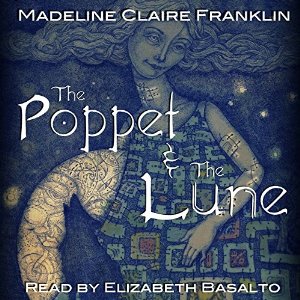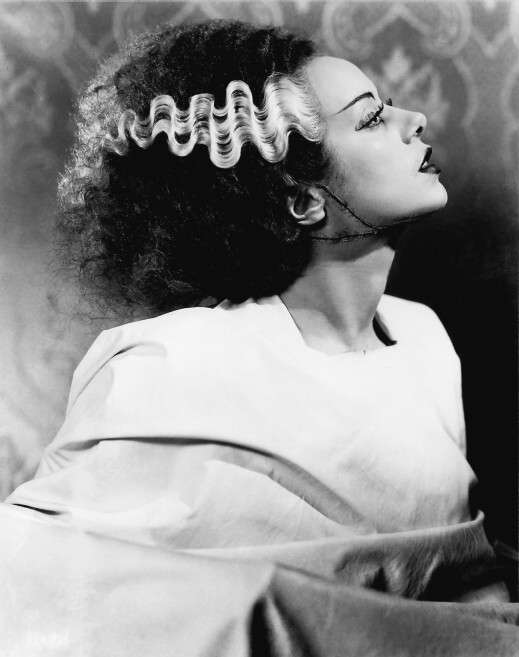 The Poppet and the Lune (2011) by Madeleine Claire Franklin is a novel in the style of a fairy tale, with fantastic elements like witches, werewolves, spells, and a girl created from dead body parts.
The Poppet and the Lune (2011) by Madeleine Claire Franklin is a novel in the style of a fairy tale, with fantastic elements like witches, werewolves, spells, and a girl created from dead body parts.Full disclosure, I got this book in audio form as a complementary review copy. About a year ago the narrator Elizabeth Basalto's sister was handing out audiobook review credits on the
Overall impression: the story was pleasant enough and the narration was okay. There are a lot of fantastic elements, as mentioned above, and there were genuinely clever and moving moments. However, I don't think the story followed through on what should have been its emotional core, and there were some Unfortunate Implications as a result. I will go into more detail on the story below, and there will be spoilers.
As for the narration,
Now, back to the story. The tale begins with tragedy: the deaths of all the children in a remote village by a freak accident. The parents, overcome by grief, ask the village witch to revive the children. The witch tells the bereaved parents this is impossible, and instead gives them the alternative of creating a new child from the salvageable body parts of the dead children. The villagers consent, and agree that this newly created child will be the child of the entire village.
Does anyone else feel a "hold it right there!" coming on? Is it really believable that the parents were all but unanimous on agreeing to this ghoulish idea? The closest real-world analogue I can think of is organ donation, something families agree to not only because they want to help others in need but to ensure that some part of the deceased loved one will survive. Still, this choice is not one that everyone makes, and that a whole village was monolithic in wanting their dead daughter's or son's body parts lopped off to create a new child requires a willing suspension of belief to say the least.
What bothers me isn't so much the plausibility of this plot development but what it signifies about the story. This right here, the faceless nature of the parents, the fact that they don't have individual personalities or messy disagreements the way real people--and indeed real characters--do, that's a clear sign. It tells us that the people who suffered this terrible traumatizing loss aren't actual characters in the story, but plot devices. The parents are of the same mind about this fraught issue not because there's a strong in-world reason for them to think the same way, but because it is convenient for the plot. And because the parents are not differentiated characters in their own right, but backdrops and devices.
So what? You might wonder. What's so wrong with some characters being more important than others in a story? Do I mean that all characters should have equal weight and no character should be subservient to the protagonist's story--indeed, that there should be no protagonist at all and all characters should be "equal?"
Well no, I'm no literary Communist, though the rest of this review may make you doubt that assertion. It's fine for a story to focus on one character above others, for sheer logistical reasons if nothing else. Multi-protagonist stories have their place, but the structure doesn't work for every type of story. So what is my beef, exactly, with the parents who lost their children being more plot devices than characters?
My problem is this: The question of who is a character and who is not also signals what a story is about. By sidelining the parents The Poppet and the Lune tells us what the story is not about: The grief of losing one's children before one's eyes. That was a hook to get the story started, but it's not what the story is about. The story instead chooses to be about something else entirely, the burden that Elizabeth, the patchwork girl created out of this loss, bears for being so Special.
I should press "pause" right here and give a brief background. This essay is informed a great deal by
So, to resume, The Poppet and the Lune fell very early on into the trap of being a story that pretends to be about something real--loss, grief, resilience--and instead became a story about nothing with any real-life meaning, namely the difficulties of being a patchwork girl sewn out of corpses.

No, not that one.
By this I don't mean the story never had real moments. The early parts, with the parents' growing disillusionment with Elizabeth the patchwork girl as their replacement child, were genuine and heartfelt and my favorite parts of the story. These parts also came close to humanizing the parents, even though they still had very little individuality and were again monolithic in their reactions. In this chapter at least the story came close to capturing something real, the sense of being adrift in your own home, the cruelty of having to live up to impossible expectations and being resented for something you cannot help.
And then, we are told, the parents start having babies and are apparently fine now. They pretty much forget about Elizabeth and she, feeling she no longer has a place, ups and leaves the village one night to seek her fortune.
Okay, what? Parents who lose their children not only--without exception--throw their new adopted child under the bus, but they bounce right back once they've had a little replacement-child therapy and replacement babies? The parents' unanimity about creating Elizabeth in the first place was somewhat implausible, but this goes beyond implausible into offensive territory. Because losing a child is not an awful trauma that can stay with you for a lifetime, right? Because parents can never think of adopted children as anything other than inferior replacements for biological ones? Because having a baby after losing other children doesn't bring up fresh emotional complications of its own?
This is dehumanizing in at least two different senses of the word: In the first place, the parents are not treated as people with full lives and complex emotional reactions in response to their own trauma. In the second, they don't act like human beings would, period.
They're not the only ones. It is made clear that Elizabeth holds no rancor or attachment for the people who apparently used her and threw her away. Again, does this seem like a plausible reaction for a human being toward people she thought of as parents? We have a term for people who are unable to feel attachment toward caretakers, and the results aren't pretty. Attachment disorder is also entirely inconsistent with how Elizabeth interacts with other people throughout the story. But if she was attached to her caretakers, it doesn't make sense for her not to be hurt the least bit by their rejection. The girl never has trouble trusting people, never lashes out from the hurt of having her trust betrayed, never makes a misstep or a bad decision. In other words, she's not human, not only in her origin but in her emotions. So why is her story relevant to human readers, again?
And even if Elizabeth herself isn't human, she does have parts of her that are. I'm not just talking body parts: Through the donated flesh she also carries around memories of the dead children of the village. This means readers are being asked to believe that rejection from and fallout with parental figures, something that causes serious distress well into adulthood, didn't set off any of the latent adolescent memories Elizabeth carried within her. I don't know what species these people are, but it's clear they're not homo sapiens.
Once Elizabeth quits the village she runs around having all sorts of adventures, meeting and befriending an intelligent wolf, being wooed by a prince, getting to know a banshee's story, finding out about the witch who created her (who was killed shortly before she could complete her creation), working magic, and making choices and a wrenching sacrifice along the way. These mid-book adventures were my second favorite parts of the story, and were genuinely colorful and interesting.
But these parts also set up my second major beef. The wolf Elizabeth befriended turns out to be a man named Faolin, who was born of a line of werewolf kings who had married human women and were living as human beings. The witch who created Elizabeth turned out to be a princess from a long line of magical witch-kings who ruled over the area. Eventually Elizabeth and Faolin fall in love, for no discernible reason other than their being the male and female protagonists.
Good thing they're both of royal origins, because by now we know what peasants are like: They reject and throw out the special people like Elizabeth and Faolin, and at best they're faithful helpers like an old man in the village where Faolin was born. (Faolin's village life, like Elizabeth's, is short on emotional resonance and individualized characters. Again, mundane life with the non-special people is just a backdrop to dispense with so the real story can begin.)
I won't go into details about the rest of the story. It should suffice to note that the protagonists overcome a heinous mutual enemy with courage and cleverness, Faolin reclaims his kingship over the werewolves, and he and the patchwork girl live happily ever after. And they never interact with the villagers from their old lives again--remember, these were backdrops, not real characters--but rather go on with their special, magical lives.
The Poppet and the Lune, in other words, is a textbook case of running away to live with the fairies: The mundane communities that the protagonists originally hail from are ultimately found lacking and irrelevant, and the struggles of these communities--things like grief, terror, and trauma--are presented only to be snatched back in favor of the important things: The specialness of the main characters as magicals and secret royal stock. The magical is always better, stronger, scarier, and more powerful than the mundane, and the issues that real people face are unimportant in the face of the supernatural.
Much like overlithe, I don't care if stories are escapist or made solely for entertainment. It's when the story pretends to deal with human issues, like living with grief, only to explicitly subordinate them to unreal trappings like patchwork girlhood and werewolf kingship, that I find the implications obnoxious. I am being asked to believe that the unreal trappings of fantasy are superior to the reality of human struggle, and that I cannot accept.
In the end The Poppet and the Lune, despite clever uses of fairy tale elements and entertaining plot developments, undermined its own power by hollowing out what it held out to be its own emotional core. It is many things, fun, colorful, romantic, action-packed, and is also, ultimately, forgettable.

no subject
Date: 2015-09-07 11:58 am (UTC)(no subject)
From:(no subject)
From: